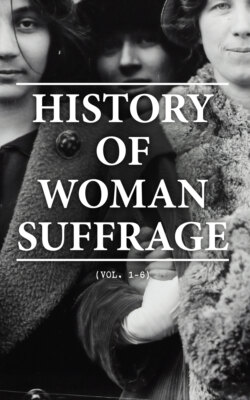Читать книгу History of Woman Suffrage (Vol. 1-6) - Various - Страница 83
На сайте Литреса книга снята с продажи.
ОглавлениеThe report was signed by James L. Angle and all the members of the Committee except Mr. Richards.
Of the report on the petitions, Mr. Weed says:
Mr. Angle, from the Select Committee of the Assembly, to which the woman's rights petitions were referred, made a report last evening, which we publish elsewhere to-day. It is a compact, lucid, and ably drawn document, highly creditable to its author, and becomingly respectful to the petitioners. The Committee report adversely to the petitions, but recommend one or two changes in our existing law, which will, we think, commend themselves as well to the opponents, as to the advocates of woman's rights.
The work in the State of New York was now thoroughly systematized. Susan B. Anthony was appointed General Agent, and it was decided to hold a series of Conventions in all the counties and chief cities of the State, in order to roll up mammoth petitions with which to bombard the Legislature at every annual session. Two appeals128 were issued to the women of the State, one in June, prepared by Mr. Channing, and one in December, by Mrs. Stanton. A number of able speakers129 joined in the work, and the State was thoroughly canvassed every year until the war, and petitions presented by the thousands until the bill securing the civil rights of married women was passed in March, 1860.
Lest our readers should think that there was no variety to our lives in these early days, that we did nothing but resolve, complain, petition, protest, hold conventions, and besiege Legislatures, we record now and then some cheerful item from the Metropolitan papers concerning some of our leading women.
New York, March 14, 1854.
ANNIVERSARY OF THE 83D BIRTHDAY OF ROBERT OWEN AT 600 BROADWAY.
When the reporter entered the room he found the ladies and gentlemen assembled there tripping the light fantastic toe to the music of a harp, piano, and violin. Ernestine L. Rose was president of the occasion, and gave a very interesting sketch of the life and labors of this noble man. After which they had a grand supper, and Lucy Stone replied to the toast, "Woman, coequal with man." The ladies not only danced and made speeches, but they partook of the supper. They did not sit in the galleries, as the custom then was, to look at the gentlemen eat, and listen to their after-dinner speeches, but enjoyed an equal share in the whole entertainment. Mrs. Rose and Miss Stone seemed to feel as much at home on this festive occasion, as amid the more important proceedings of a convention.
As the agitation was kept up from year to year with frequent conventions, ever and anon some prominent person who had hitherto been silent, would concede a modicum of what we claimed, so timidly, however, and with so many popular provisos, that the concessions were almost buried in the objections. It was after this manner that Henry Ward Beecher, then in the zenith of his popularity, vouchsafed an opinion. He believed in woman's right to vote and speak in public. There was no logical argument against either, but he would not like to see his wife or mother go to the polls or mount the platform. This utterance called out the following letter from Gerrit Smith in The Boston Liberator:
Peterboro, N. Y., Nov. 19, 1854.
Dear Garrison:—I am very glad to see in your paper that Henry Ward Beecher avows himself a convert to the doctrine of woman's voting. But I regret that this strong man is nevertheless not strong enough to emancipate himself entirely from the dominion of superstition. Mr. Beecher would not have his wife and sister speak in public. Of course he means that he would not, however competent they might be for such an exercise. I will suppose that they all remove to Peterboro, and that a very important, nay, an entirely vital question springs up in our community, and profoundly agitates it; and I will further suppose that the wife and sister of Mr. Beecher are more capable than any other persons of taking the platform and shedding light upon the subject. Are we not entitled to their superior light? Certainly. And certainly therefore are they bound to afford it to us. Nevertheless Mr. Beecher would have them withhold it from us. Pray what is it but superstition that could prompt him to such violation of benevolence and common-sense? Will Mr. Beecher go to the Bible for his justification? That blessed book is to be read in the life of Jesus Christ; and in that life is the fullness of benevolence and common-sense, and no superstition at all. Will Mr. Beecher limit his wife and sisters in the given case to their pens?130 Such limitation would he then be bound in consistency to impose upon himself. Would he impose it? Again, it takes lips as well as pens to carry instruction to the utmost.
Gerrit Smith.
Your friend,
